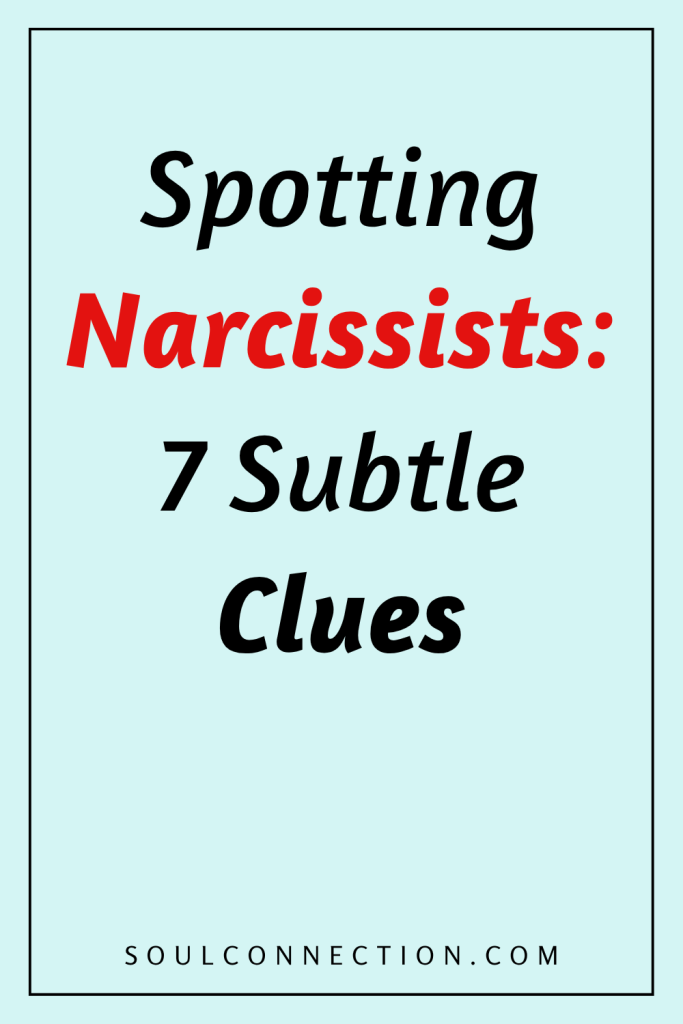The charm. The confidence. The magnetic first impression.
Narcissists don’t exactly wear a name tag. Yet, after the honeymoon period fades, you might notice things feel strangely off.
If you’ve ever walked away from a conversation feeling like you’ve been spun in a dryer, you might be dealing with a pro-level narcissist. No need to channel your inner Sherlock—there are hints, and some are sneakier than you’d expect.
Here’s your (very handy) guide to 7 subtle clues that someone in your orbit might be sporting a secret crown of self-obsession.
1. Conversation Always Circles Back to Them
Want to talk about your day? Their dog walked farther. You got a promotion? They basically invented your industry.
Narcissists manage to turn any conversation, no matter how unrelated, into a one-man show starring them.
Even when attempting to comfort you, the subject shifts before you can say “ego trip.” You’ll find your stories and emotions treated as mere stepping stones for their own anecdotes.
It’s like conversational whack-a-mole—no matter where you try to go, the mallet of me, me, me keeps coming down.
How to spot it tonight: Try sharing something personal or challenging. Notice if you get a genuine, interested response, or if you’re quickly relegated to the audience again.
2. Apologies Are Rare, or Wrapped in Excuses
Everyone messes up, but most people (who aren’t robots or reality TV villains) can say “I’m sorry” and mean it. Narcissists struggle here.
If called out, they might offer the world’s most backhanded apology: “I’m sorry you feel that way.” Translation: “Your emotions are your problem.”
Sometimes, their apologies come laced with justifications, finger-pointing, or a subtle twist that leaves you second-guessing yourself. You might walk away wondering why you’re the one apologizing instead.
Sound familiar? Tonight, clock the next apology. Is it short, sincere, and focused on the impact? Or does it come wrapped in self-defense and a vague sense of being gaslit?
3. Boundaries? What Boundaries?
Ever had your privacy invaded “for your own good”? Narcissists treat boundaries the same way toddlers treat bedtime routines: with extreme skepticism and crafty workarounds.
Independence, space, or the word “no” often set off alarm bells. They might guilt-trip, question your loyalty, or bulldoze right past your comfort zone.
Even little things, like reading your messages without asking or showing up unannounced, can signal that they see your personal space as optional.
If you feel like you’re constantly renegotiating the basics—how much alone time you get, who you see, what you share—that’s a giant red flag, even if it’s draped in concern.
4. Subtle (or Not-So-Subtle) Need for Admiration
You’ll hear about their “achievements” before you even know their surname. Compliments are relished like gourmet meals, and criticism—even the gentle, loving kind—is treated like a personal attack.
Sometimes, the need for attention is obvious (think: humblebragging about their tenth consecutive gym session). Other times, it’s sneakily fished out with self-deprecating comments, hoping you’ll rush in to reassure them.
If you notice a pattern—praise keeps the peace, while constructive feedback brings out silent treatment or a full-blown sulk—consider this box well and truly ticked.
5. Compassion Is Performed, Not Felt
Empathy is a hard act for narcissists. They’re excellent at mimicking care when it suits them, but the veneer slips when the spotlight shifts.
You might find your feelings acknowledged with textbook phrases, but something’s missing. Maybe it’s eye contact, timing, or the total absence of follow-through.
On paper, they look like the world’s most attentive partner. In practice, your needs rarely get met, and you’ll spot their interest fade if the conversation isn’t about their success, health scare, or emotional journey.
This isn’t always easy to clock, especially in the beginning. Keep an eye on the pattern: does support arrive when it serves their image or when you genuinely need it?
6. They’re the Victim in Every Story
Ever notice how nothing is ever their fault? Traffic, their exes, bosses, the weather—life just keeps happening to them. Somehow, everyone else is out to get them, and you’re expected to agree or at least sympathize.
If you try to point out their role in the drama, be prepared for denial, deflection, or a subtle shift that leaves you wondering if you’re the villain.
Narcissists are masters at rewriting history, omitting juicy details that might put them in a less-than-flattering light.
An easy test for your next conversation: Listen for recurring complaints where blame always lands somewhere else (preferably with a side of “woe is me”).
7. Idealize, Devalue, Discard
The opening act is pure magic. You’re the most fascinating person they’ve ever met. You can do no wrong. Then, slowly, the pedestal tilts.
Suddenly, your flaws are noticed—often exaggerated.
The praise disappears, replaced by eye rolls, criticism, or even silent withdrawal. This whiplash-inducing cycle (idealize, devalue, discard) is a narcissist’s signature move.
Relationships become a minefield, where you tiptoe to avoid falling from grace.
One day you’re a genius, the next you’re accused of not caring enough about their needs, and before you know it, you’re being ghosted or given the cold shoulder.
If your relationship has more ups and downs than a soap opera marathon, and you find yourself confused about where you stand, this could be why.
What to Do If You’ve Spotted These Clues
Recognizing these patterns can feel both validating and rattling. Narcissists aren’t all cartoon villains—they’re often wounded themselves, stuck in a loop of self-preservation and shallow connection.
But spotting these behaviors early saves your sanity (and hours of “what did I do wrong?” rumination).
Here’s what you can try, starting tonight:
- Set clear boundaries—and stick to them, even if it ruffles some feathers.
- Limit personal sharing until trust has been earned through consistent, respectful actions.
- Seek outside perspective from friends, family, or a mental health professional who won’t be dazzled by charm.
- Trust your gut. If you feel drained, confused, or continuously off-balance, your instincts are waving a red flag. Listen.
- Don’t try to fix them. You didn’t break them, and changing a narcissist is about as likely as teaching a goldfish to ride a bicycle.
Nobody’s perfect, and everyone can have selfish moments. But if these clues are lighting up your relationship dashboard like a Christmas tree, it might be time to reconsider just how much airtime you give the drama.
You Deserve Connection—Not Confusion
Spotting narcissism isn’t about labeling or sending someone to the Relationship Gulag. It’s about protecting your peace, your dignity, and your emotional health.
Embrace curiosity, but don’t ignore your comfort zone. There’s a world of difference between someone who wants to share your joy and someone who just wants a spotlight.
Genuine love, friendship, or partnership leaves you feeling seen, valued, and safe to be wonderfully imperfect.
Never settle for less. Not even if they claim they invented the word “love” itself.


